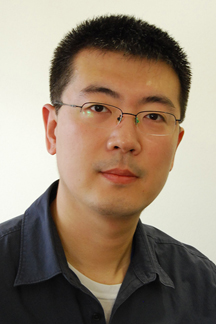Noted Vaccine and Bioinformatics Researcher Joins Faculty
By Mika Ono
The Scripps Research Institute (TSRI) has appointed Jiang Zhu to its faculty. Zhu joins the institute from the National Institutes of Health, where held a position as staff scientist and helped establish the Structural Bioinformatics Core Section in the Vaccine Research Center.
Zhu will hold appointments on TSRI’s California campus in both the Department of Immunology and Microbial Science and the Department of Integrative Structural and Computational Biology.
“I am delighted Jiang is joining us,” said Argyrios N. Theofilopoulos, chair of TSRI’s Department of Immunology and Microbial Science. “His expertise in aspects of vaccine development complement our initiatives working towards new vaccines for diseases such as AIDS and influenza.”
“I would like to offer Jiang a warm welcome,” said Ian Wilson, chair of the Department of Integrative Structural and Computational Biology, Hansen Professor of Structural Biology and member of the Skaggs Institute for Chemical Biology at TSRI. “Jiang’s diverse research program includes work on novel technology to control neural circuits with light. He is also developing new tools for cryo-electron microscopy that will advance our understanding of molecular complexes. We look forward to the unique expertise that Jiang brings to TSRI and to many productive collaborations and exciting scientific advances.”
Multi-Disciplinary Research Interests
Zhu earned a BS in Biology (1998) and a PhD in Computational Chemistry and Computational Biology (2002) from the School of Life Sciences at the University of Science and Technology of China. He conducted postdoctoral work at Howard Hughes Medical Institute and Columbia University, becoming an associate research scientist at Columbia in 2008.
In 2009, he joined the Vaccine Research Center of the National Institutes of Health’s National Institute of Allergy and Infectious Diseases. Among his many publications, he is a first author of a 2011 Science cover story on the structural and deep sequencing analysis of broadly neutralizing antibodies against HIV (333(6049):1593-602).
He started at TSRI as an assistant professor on February 1.
“I feel lucky to be joining Scripps and to have the opportunity to pursue excellence in science,” Zhu said. “I was attracted to Scripps by the freedom to pursue my ideas and the research I love. I also look forward to the opportunity to work with students and postdocs as part of my group.”
Zhu’s interdisciplinary research program focuses on three areas.
In his work on immunology and vaccines, Zhu is developing bioinformatics tools to analyze antibodies that effectively neutralize HIV, flu and other infectious agents, as well as designing immunogens (substances that induce immunity) against these diseases. Zhu will be participating in TSRI’s Center for HIV/AIDS Vaccine Immunology & Immunogen Discovery (CHAVI-ID), led by Professor Dennis Burton.
In his neurobiology research, Zhu is working on an innovative line of work that uses light to control neurological circuits, an emerging field known as “optogenetics.” In this effort, he will seek to understand photosensitive proteins and to develop tools to engineer, optimize and design genetically encoded protein devices. In this effort, he is focusing on calcium channels, which are important for conditions such as heart disease, and glutamate receptors, which play a critical role in nervous system disorders. “If we can control these two molecules, we can impact a large swath of neuroscience research,” he said.
In the area of structural biology, Zhu is developing computer methods that can help scientists better understand the molecules that often function cooperatively by forming a complex or machine during important biological processes. As part of this effort, Zhu is developing a computational platform to use cryo-electron microscopy data to produce detailed high-resolution models of these important structures.
Send comments to: press[at]scripps.edu














